Going blind is a frightening thought, yet many of us know very little about glaucoma.
Known as ‘the silent thief of sight’, glaucoma develops slowly, often without symptoms. It is estimated that the condition currently affects as many as 300,000 Australians, with some 50 per cent of cases undiagnosed.
Left untreated, glaucoma can cause vision loss and may even lead to blindness. Anyone may develop glaucoma, but the incidence increases with age. About one in 10,000 babies are born with glaucoma, by age 40 about one in 200 have glaucoma, rising to one in 8 at age 80.
Glaucoma usually occurs when the optic nerve, which connects the eye to the brain, becomes damaged as a result of fluid building up in the front area of the eye, which in turn increases pressure within the eyeball.
If left unchecked, it can cause irreversible damage to vision, so it’s important to diagnose and treat glaucoma early. The only way to do this is to go for frequent eye checks, otherwise you could be risking your sight without knowing it.
Almost 80 per cent of people would choose sight as the sense they would least like to lose, yet many don’t visit the optician until something goes wrong with their eyes or sight.
We spoke to Specsavers optometrist Dr Josie Forte, to learn more about the condition. Here she shares six little-known facts about glaucoma.
1. Glaucoma can be symptomless
People with 20/20 vision can have glaucoma and not realise it. You may not notice any difference in your vision, because it tends to affect your peripheral vision first – which you may not even be aware of. It’s only when it progresses to moderate or advanced glaucoma that people start to notice changes to their vision quality. “Regular eye tests are so important,” says Dr Forte, “as they potentially enable a diagnosis before any noticeable visual loss has occurred.”
2. Your family history could affect your risk of developing it
“Age, family history and even ethnicity all play a role,” explains Dr Forte. “If you’re over 40, have a family history of glaucoma, are short-sighted or diabetic, you have a higher risk of glaucoma and should mention this at your next sight test.”
3. People of African, Caribbean or Asian origin are at a higher risk
It’s often unclear why a build-up of pressure in the eye happens, but research has found that ethnicity can increase or decrease the risk, with glaucoma more common in people of African, Caribbean or Asian origin.
4. Eye tests for glaucoma are quick and painless
Glaucoma can usually be detected during a routine eye test, often before it causes any noticeable symptoms. The test does not hurt or feel uncomfortable and should only take around 15 minutes. “Tests involve the optometrist looking at the appearance of the main nerve in the eye, a measurement of the pressure in the eye, and checking the field of vision,” says Dr Forte.
5. Glaucoma can affect anyone at any age
“It is not an age-related sight loss condition,” says Dr Forte. “Primary open angle glaucoma becomes more common as you get older and, although uncommon below the age of 40, it’s important to get checked for the early signs.”
6. Glaucoma can be managed
It’s not possible to reverse any loss of vision that occurred before glaucoma was diagnosed, but treatment can help to stop any further visual impairment. Regardless of whether somebody with glaucoma has noticed damage to their vision or not, the condition can often be managed with specific eye drops. “These are normally prescribed by an ophthalmologist at an eye hospital,” explains Dr Forte, “commonly after referral by an optometrist.”
If you’re worried about glaucoma, advice is available on the high street.
Specsavers works with Glaucoma Australia to help raise glaucoma awareness, increase early detection rates and improve treatment adherence to avoid preventable vision loss from glaucoma.
Do you have routine eye tests? Have you been diagnosed with glaucoma? If so, do you take eye drops to prevent it worsening?
– With PA
If you enjoy our content, don’t keep it to yourself. Share our free eNews with your friends and encourage them to sign up.
Related articles:
https://www.yourlifechoices.com.au/health/news/saving-your-eyesight-early
https://www.yourlifechoices.com.au/health/your-health/diet-change-could-save-eyesight
https://www.yourlifechoices.com.au/health/your-health/how-to-protect-your-eyesight

